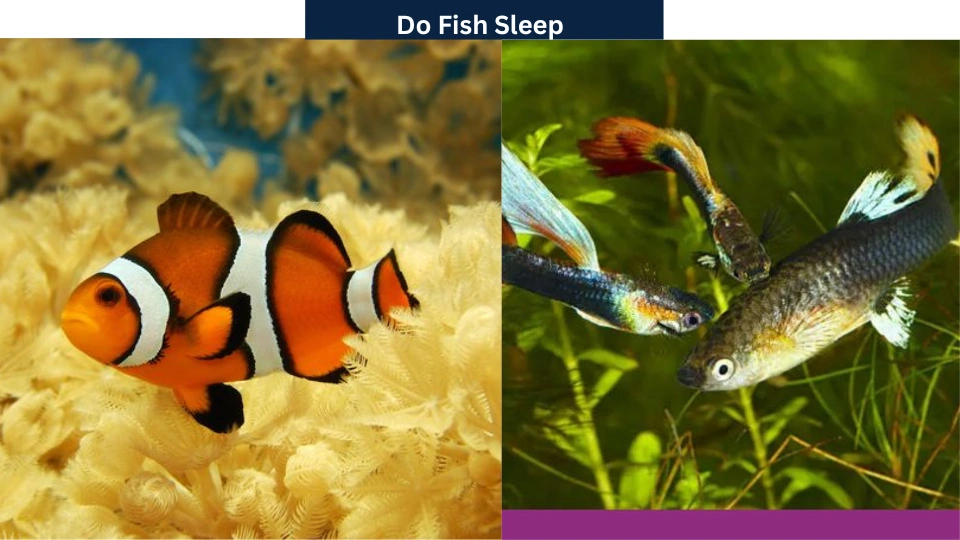Last Updated on March 2, 2024 by Aftab Tariq
Do fish sleep? Sleep is super important for us, helping our bodies work well, grow, and live longer. If we don’t get enough sleep, our health and thinking can be affected. This is also true for animals like fish.
Many animals, including us, need to rest to keep our bodies healthy and recharge. You can tell when animals are sleeping because they close their eyes, lie down, and don’t respond to gentle touches. But fish are different. They don’t have eyelids to close their eyes, and their brains work in a way that’s not like mammals. So, do fish actually sleep?
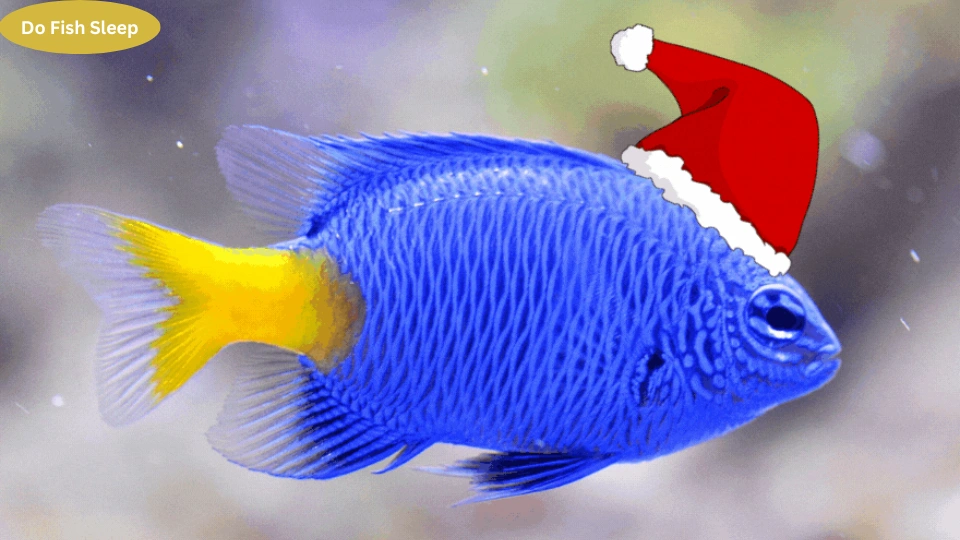
Scientists found out that fish don’t sleep the way we do, but they have a restful state where they stay still, breathe less, and have lower brain activity. Even though it’s different from how other animals sleep, it helps fish stay healthy and resist diseases. In simple terms, yes, fish do “sleep” in their own unique way.
Now, when it comes to how animals sleep, it can be quite diverse. Fish, in particular, have a unique way of resting that some scientists prefer to call rest instead of sleep. Let’s explore more about how fish take their rest!
How Do Fish Sleep?
When scientists at Stanford University used state-of-the-art technology, they found that Zebra Danios sleep much like humans. They discovered that these fish have different sleep stages, including paradoxical sleep, which is a deep kind of sleep.
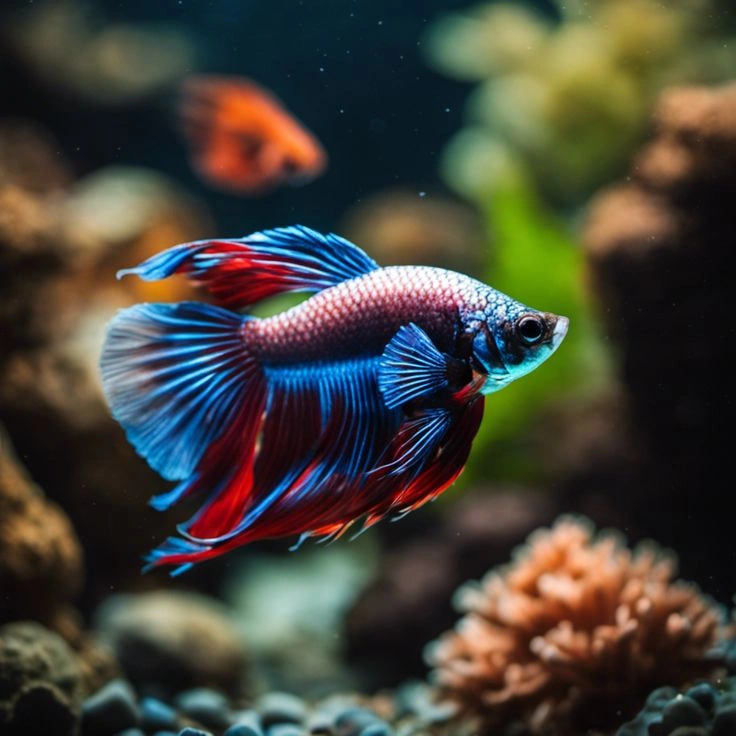
However, unlike humans, during paradoxical sleep, they don’t have rapid eye movement (REM), and they don’t close their eyes because they don’t have eyelids.
While most fish stay still when they sleep, some sharks need to keep moving even when resting to breathe through their gills. Interestingly, certain types of Parrotfish and Wrasses create a sort of sleeping bag by surrounding themselves with a slimy cover. Scientists think this sleeping bag might help protect them from predators or parasites.
Swimming During Sleep
Fish need oxygen to breathe, just like we do with air. They take in oxygen from the water through their gills. When water moves past their gills, it brings in the oxygen they need. Some fish can stay still in the water and still get oxygen by facing the current and moving their fins a little.
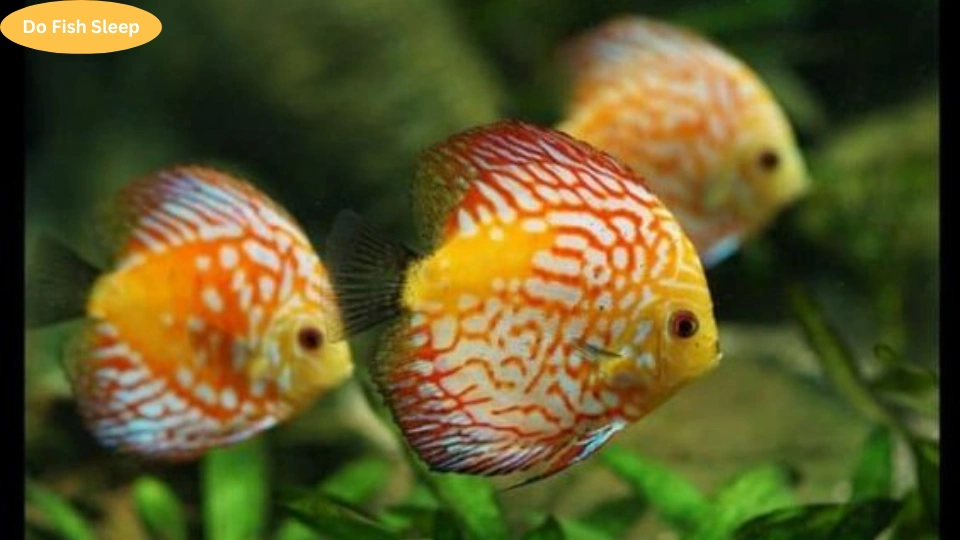
But others, like certain sharks and rays, need to keep moving to get enough oxygen. They have to swim to push water over their gills.
When fish sleep, they do it in a special way called unihemispheric sleep. This means they can sleep with one half of their brain at a time. The other half stays awake. So, even when they’re sleeping, fish can keep swimming, though more slowly.
If fish had eyelids, one eye would close when one half of the brain sleeps, but the other eye would stay open. This is similar to what some birds and whales do when they sleep.
Differences Between Estivation and Sleep
Some fish sometimes go into a special sleep called estivation. This sleep is like hibernation, but it happens when it’s dry, not cold. Fish, reptiles, and amphibians might estivate when they don’t have much food or water. During estivation, their bodies slow down a lot, so they can survive without much water or food for a long time.
Cavefish don’t estivate, but they change how much they sleep depending on how much food they can find. When food is scarce, they sleep more. When there’s plenty of food around, they sleep less.
Where Fish Sleep?
Different types of fish exhibit diverse sleeping habits. Some may find refuge in grottos, nestled amidst the rocks and crevices, while others seek shelter among corals, blending in with the vibrant marine environment. Occasionally, fish may appear stuck in décor or hollow logs while they slumber, but this is simply a part of their natural behavior.
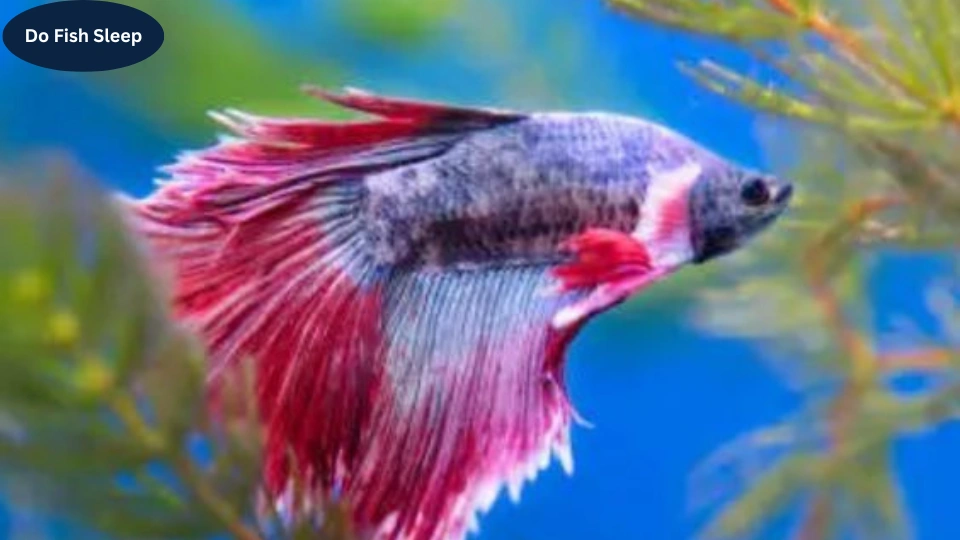
Whether they rest at the bottom, hide in sand, or hover near plants and driftwood, each species has its preferred sleeping spot. So, if you observe your fish seemingly immobile in such locations, there’s typically no cause for concern, as it’s a common behavior among many aquarium inhabit.
Do Fish Sleep in Aquarium?
Yes, fish can sleep in an aquarium. Similar to in the ocean, fish in aquariums also have periods of rest or reduced activity. They may find a quiet spot in the aquarium to rest, or they might even rest near the bottom or among plants or decorations. So, yes, fish do sleep in aquariums.
Do Fish Sleep in the Ocean?
Yes, fish do sleep, but it’s different from how humans do it. Most fish don’t have eyelids, so they don’t close their eyes like we do. Instead, they have periods of rest or lowered activity, often near the ocean floor or in sheltered spots. This helps them conserve energy.
Is there a Circadian Rhythm in Fish?
Many fish have a routine for sleeping and waking up, just like people and other animals. Their body clocks, called circadian rhythms, react to light, much like ours do. Light makes us feel awake during the day and sleepy at night.
Scientists studied zebrafish and found that when they disturbed the fish’s sleep with light or other things, the fish woke up. But only light made them sleep less for days afterward.
Most animals follow a schedule based on light and darkness. But there are fish, like cavefish deep in the sea, that can’t see because it’s always dark where they live. Even though they can’t see, they still have routines for sleeping and waking up. Scientists think other things, like when they eat, might affect their sleep patterns.
When Do Fish Sleep?
Scientists think that most fish sleep like humans and other animals. Some fish are active during the day and sleep at night, while others are active at night and sleep during the day. Some fish, like catfish and plecostomus, are night prowlers.
They sleep during the day in caves or crevices and hunt at night. Sometimes, this can cause problems in aquariums if different types of fish with different sleeping habits are kept together. For example, small tetras might be resting at the bottom while large-mouthed catfish are looking for food. This doesn’t mean the catfish are mean; they’re just hungry!
Fish may not sleep when they are taking care of their babies. Some fish, like Tilapia, may not start sleeping until they are about 5 to 6 months old. Wild fish also don’t sleep when they are moving from one place to another.
Aquarium fish typically don’t migrate unless their tank is moved to a different location. Additionally, blind cave fish may not sleep because they are always in the dark and don’t have a clear sense of day and night.
How Do you Know if a Fish is Sleeping?
You can tell if your fish are sleeping when:
- They stay still for a while.
- They lie on the bottom or on something in the tank.
- They don’t react to what’s happening around them.
- They do these things at the same time every day, especially when the tank light is off.
Do Fish Have Sleep Disorders?
Scientists haven’t studied fish sleep a lot, but they looked at Zebra Danios. They found that when these fish were kept awake for a few days with a gentle electric current, they slept more when they could rest normally again.
But, when they were in constant light for days, they slept okay when they got back to a regular day and night schedule. Scientists believe light might stop the hormone that makes them sleep, called melatonin, in these fish. But we need to learn more about this.
How Do I Make Sure My Fish Get Enough Sleep?
If you want to make sure your fish get enough sleep, you can do a few simple things. First, set up a timer for the light in your fish tank. This will make sure they have a regular schedule, like day and night, just like we do.
Also, make sure there are lots of hiding spots in the tank for them to feel safe when they sleep. If you have a fish tank in a kid’s room and use it as a night light, turn off the light during the day and close the curtains. This helps the fish think it’s nighttime.
Just like us, fish need sleep to stay healthy and happy! So it’s important to make sure they get enough rest.
Fish Sleeping Video Insight
That fish sleeping video was so relaxing to watch!
Note: Fish rest, showing reduced brain activity and metabolism. Sleep patterns vary; some, like sharks, must move for oxygen, while others seek shelter. Duration varies from minutes to hours, influenced by environment. Studying fish sleep offers insights into behavior and evolution.
Frequently Asked Question
How Long Do Fish Sleep?
Studies show that fish are active during the day and rest at night, much like humans. Some types of fish, such as catfish and knife fish, are known to be active at night. It’s also suggested that fish might not sleep all the time during their life.
Do Fish Sleep at Night?
Researchers believe that most fish follow regular sleep patterns like humans and other animals. Many aquarium fish are active during the day and rest at night, while some species prefer to be active at night and sleep during the day in caves or crevices.
Do Fish Sleep With their Eyes Open?
Although it might seem strange and unbelievable to us humans, who typically associate sleep with closing our eyes or eyelids, fish lack eyelids (except for sharks), so they don’t close their eyes. Consequently, they sleep with their eyes open.
Do Fish Sleep at Night in a Tank?
Yes, many fish do sleep at night even when they are in a tank. However, the sleep patterns of fish can vary depending on the species and environmental conditions within the tank. Some fish are diurnal, meaning they are active during the day and rest at night, while others may be nocturnal, being more active at night and resting during the day.
Do fish Close their Eyes When they Sleep?
As peculiar and improbable as it may seem to us humans, whose sleep is closely tied to the act of closing our eyes, fish have a different approach. Unlike humans, fish lack eyelids (except sharks), leading them to sleep with their eyes open.
Do Goldfish Sleep?
Goldfish don’t sleep lying down like us. Instead, they slow down and stay still, almost like they’re hovering in the tank or pond, usually near the bottom with their heads pointing slightly downwards.
Do Sharks Sleep?
While it’s true that certain species of sharks, like the nurse shark, have adaptations such as spiracles that allow them to rest without continuous swimming, not all sharks require constant movement. Unlike humans, sharks don’t experience sleep in the same way; instead, they have periods of activity and rest.
Do Fish Sleep at the Bottom of the Tank?
Some fish may indeed sleep at the bottom of the tank, but not all fish do. Fish can sleep in various locations within the tank, including near the bottom, among plants, decorations, or other structures, or even floating near the surface without moving much.
Sources
I am a dedicated content writer with more than five years of experience, particularly skilled in the art of storytelling. My writing journey commenced during my college years, where I pursued journalism and unearthed my talent for creating captivating narratives.

